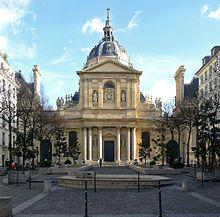
Back جامعة السوربون الجامعة Arabic Універсітэт Сарбона Byelorussian Universitat Sorbona Catalan Sorbonne Université Czech Sorbonne Université German Πανεπιστήμιο Σορμπόν Greek Universidad Sorbona Spanish Sorbonne'i Ülikool Estonian Sorbona Unibertsitatea Basque دانشگاه سوربن Persian
 | |
| Motto | Créateurs de futurs depuis 1257 (French) |
|---|---|
Motto in English | Creators of futures since 1257 |
| Type | Public research non-profit coeducational higher education institution |
| Established |
|
Academic affiliations | EUA LERU UNICA TPC |
| Endowment | €900 million |
| Budget | €1 billion (2021) |
| President | Nathalie Drach-Temam |
Academic staff | 6,400 |
Administrative staff | 3,600[1] |
| Students | 55,600 (2019) |
| Location | 21 Rue de l’École de Médecine 75006 Paris , |
| Campus | Latin Quarter; Clignancourt; Jussieu; Institut de Géographie; Malesherbes |
| World Ranking | 35 (ARWU) |
| Colors | Blue and Red |
| Nickname | Sorbonne |
| Website | sorbonne-universite.fr |

Sorbonne University (French: Sorbonne Université) is a public research university located in Paris, France. The institution's legacy reaches back to the Middle Ages in 1257 when Sorbonne College was established by Robert de Sorbon as one of the first universities in Europe.
Sorbonne University is one of the most sought after universities by students and researchers from France, Europe, and the French speaking countries. Most notably, Marie Skłodowska-Curie, who came from Poland in 1891 and joined the faculty of sciences of the Sorbonne, was also the first woman to become a professor at the Sorbonne. Marie Curie and her husband Pierre Curie are considered the founders of the modern-day Faculty of Science and Engineering of Sorbonne University. As of 2021, its alumni and professors have won 33 Nobel Prizes, six Fields Medals, and one Turing Award.[2]
- ^ "Sorbonne University | Arts and Humanities, Medicine, Science and Engineering". 17 September 2018. Archived from the original on 17 September 2018. Retrieved 15 January 2022.
- ^ "Awards and recognition". Sorbonne Universite. Archived from the original on 9 July 2019. Retrieved 9 July 2019.





